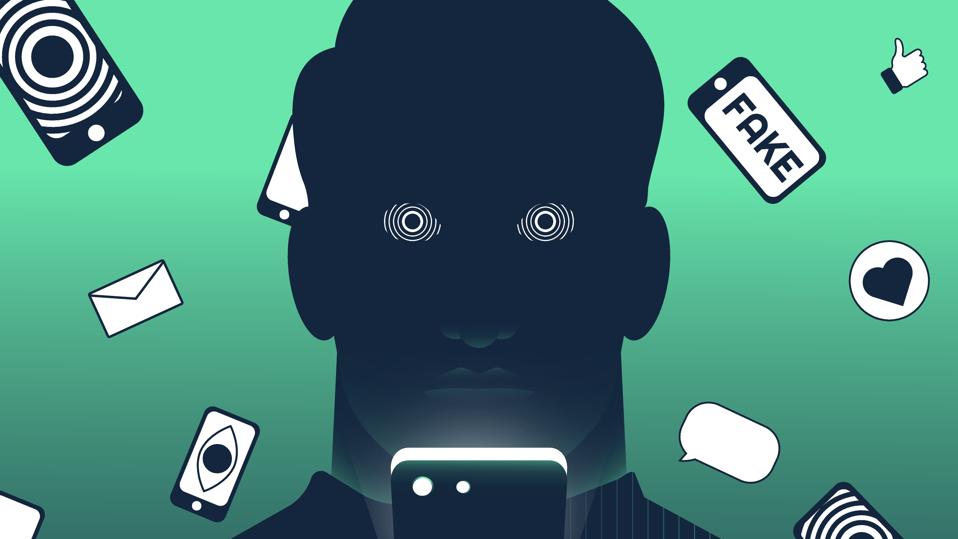A new review of literature reveals the unique impact “conspiracy theories” can have on romantic relationships. Here’s how they could be affecting yours.
getty
The impacts of the COVID-19 pandemic extended much farther beyond our health systems and careers alone. According to an August 2025 scoping review published in the Journal of Couple & Relationship Therapy, aspects of the pandemic may have infiltrated our relationships, too. Specifically, the conspiracy theories that surrounded it.
Therapists have begun to hear some new and troubling information from their clients since. Partners who once felt completely aligned and connected suddenly found themselves facing a wide gap in their apparent ideologies. Some spouses suddenly started spending hours scrolling through online forums, or watching videos that push conspiracist narratives. In turn, the other partner is left absolutely bewildered and unsure of who they were living with.
As the lead author of the study Dr. Kara Fletcher — both a therapist and researcher — explained to me in an interview, “My clients were describing no longer recognizing their spouse or romantic partner, and feeling lost and alone.”
In light of this, Fletcher and her research team decided to review the scientific literature on COVID-19-related conspiracy theories, disinformation and political polarization to see what we know about their impact on intimate relationships.
The results were surprising in various ways. Although the review did indeed support the idea that conspiracy theories can be harmful to relationships, it became evident that very little research has looked into these effects. Only two directly relevant studies could be found.
Still, their review, along with pilot interviews that are currently underway, gives us some clarity: conspiracy theories can both distort our worldview and corrode the foundation of romantic relationships.
Here’s how, according to both emerging research and clinical experience.
1. Fundamental Clashes In Personal Values
All strong relationships are usually founded upon an alignment in personal values. Even if partners don’t agree on every single detail pertaining to religion or politics, most healthy couples nevertheless share a rudimentary worldview. These are what make compromise and empathy possible in some of the most important decisions made in a long-term relationship.
But conspiracy theories, regardless of their nature, can threaten this shared sense of unity. As Fletcher explains, “Conspiracy theories can damage relationship health because couples are encountering value clashes and realizing that they no longer understand their partner.”
Disagreeing on some points is one thing. You are well within your rights to maintain a different opinion on a certain album or movie to your partner, to have a different love language to them or even to diverge in your political or philosophical views. It’s another thing, however, to have a partner suddenly embrace a wholly new way of seeing the world that feels totally alien from your own.
As a 2022 study from Current Opinion in Psychology found, beliefs in conspiracy theories can have highly dangerous real-world impacts. They’ve been consistently shown to have potentially harmful impacts on both personal and public health (in terms of vaccines), political engagement and intergroup relations. The study was even able to link these beliefs with the incitement of violence and extremism.
From this perspective, it can be incredibly disorienting to discover that the person you love and trust most in the world believes in something that can have very real, dangerous impacts. Leaving a conversation with your other half to have learned that they think vaccines are secretly harmful or that election results are rigged can be utterly dumbfounding. It might feel as though you’ve woken up next to a stranger.
That said, the specifics of the conspiracy theories themselves aren’t necessarily the source of this issue. As Fletcher explains, “I think the impact on relationships is more about what the belief in those conspiracy theories represent — whether that’s believing something that now creates a fundamental clash in values, or the idea that your partner can adopt a belief that seems inconceivable to you.”
Concluding, she notes, “I think this causes disillusionment and causes the intimate partner to question, ‘Who are you, and what did you do with my partner?’”
In this sense, one might feel as though a meaningful discussion with their partner is suddenly impossible; they might not be able to shake the feeling that their partner is, somehow, not the same person they were before. Conversations that would’ve otherwise been fun and intellectually stimulating will start to feel childish and ignorant. They then, in turn, may stop seeing the point in engaging with them at all.
2. Breakdowns In Communication
It’s no secret that communication is a make-or-break determinant of relationship health. Not perfect communication, of course, but just enough openness and empathy to give yourself and your partner a way to tough out difficult conversations. But, as Fletcher suggests, conspiracist beliefs can disrupt this process.
Outside of the 2025 review, she notes that, “In our pilot study interviews, people have described no longer speaking with their partner about anything other than day-to-day household management, as other discussions go nowhere and end in conflict.”
The narrowing of communication channels is perhaps the most devastating impact conspiracies can have on a relationship. Because every exchange risks devolving into an ideological spar, partners may feel less inclined to share the personal thoughts and feelings that contribute so greatly to intimacy.
And even if conspiracies don’t actually make their way into conversations, their undertone — just knowing that a partner still holds them, even if they aren’t openly talking about it — can be understandably hard to ignore.
This is why, over time, staying silent may start to feel much safer than speaking to one another. A 2024 study from the Journal of Applied Social Psychology notes that this is likely due to what the authors call “attitudinal distancing.”
The non-believing partner may start to emotionally withdraw from the other, purely out of self-preservation. They may fear deeper conversations due to their anticipation of ideological landmines. The believer, in turn, may feel just as dismissed or misunderstood as the other, which ultimately closes the loop of alienation from both ends.
Neither partner feels a sense of connection in terms of their attitudes, so neither feels the motivation or sees the good in closing the gap.
The sad irony of this is that conspiracy theories often claim to reveal “hidden truths.” But, in reality, all they seem to do is obscure partners from one another. This problem is only compounded by the silence that surrounds it.
Fletcher notes that people affected by a partner’s conspiracy beliefs are seemingly hesitant to talk about it, even within research settings. She explains, “In our experience trying to interview those affected for our ongoing pilot study, we have found people are nervous to share what is happening with their partner, and do not want them to find out.” The shame and fear, contrasted with the love they may still have for their partner, only goads the silence further.
This only makes the problem harder to study, and even harder to solve. It also means that many couples may feel alone in their struggle.
But, as Fletcher explains, new avenues for overcoming this are already emerging: “I have already had people email me thanking our team for writing this review, as it has helped them realize they’re not alone in being in a relationship with someone who believes in conspiracy theories.”
Curious if your own belief in conspiracy theories could be impacting your relationship? Take this science-backed test to find out: Generic Conspiracist Beliefs Scale









